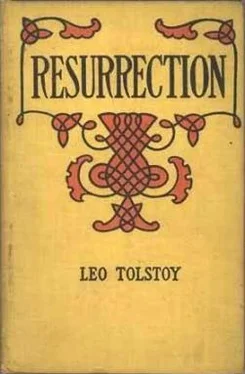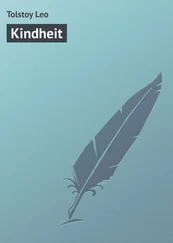Leo Tolstoy - Resurrection
Здесь есть возможность читать онлайн «Leo Tolstoy - Resurrection» весь текст электронной книги совершенно бесплатно (целиком полную версию без сокращений). В некоторых случаях можно слушать аудио, скачать через торрент в формате fb2 и присутствует краткое содержание. Жанр: Русская классическая проза, на английском языке. Описание произведения, (предисловие) а так же отзывы посетителей доступны на портале библиотеки ЛибКат.
- Название:Resurrection
- Автор:
- Жанр:
- Год:неизвестен
- ISBN:нет данных
- Рейтинг книги:4 / 5. Голосов: 1
-
Избранное:Добавить в избранное
- Отзывы:
-
Ваша оценка:
- 80
- 1
- 2
- 3
- 4
- 5
Resurrection: краткое содержание, описание и аннотация
Предлагаем к чтению аннотацию, описание, краткое содержание или предисловие (зависит от того, что написал сам автор книги «Resurrection»). Если вы не нашли необходимую информацию о книге — напишите в комментариях, мы постараемся отыскать её.
Resurrection — читать онлайн бесплатно полную книгу (весь текст) целиком
Ниже представлен текст книги, разбитый по страницам. Система сохранения места последней прочитанной страницы, позволяет с удобством читать онлайн бесплатно книгу «Resurrection», без необходимости каждый раз заново искать на чём Вы остановились. Поставьте закладку, и сможете в любой момент перейти на страницу, на которой закончили чтение.
Интервал:
Закладка:
“You do not plead guilty of having stolen 2,500 roubles?” asked the president.
“I’ve said I took nothing but the 40 roubles.”
“Well, and do you plead guilty of having given the merchant Smelkoff a powder in his drink?”
“Yes, that I did. Only I believed what they told me, that they were sleeping powders, and that no harm could come of them. I never thought, and never wished. . . God is my witness; I say, I never meant this,” she said.
“So you do not plead guilty of having stolen the money and the ring from the merchant Smelkoff, but confess that you gave him the powder?” said the president.
“Well, yes, I do confess this, but I thought they were sleeping powders. I only gave them to make him sleep; I never meant and never thought of worse.”
“Very well,” said the president, evidently satisfied with the results gained. “Now tell us how it all happened,” and he leaned back in his chair and put his folded hands on the table. “Tell us all about it. A free and full confession will be to your advantage.”
Maslova continued to look at the president in silence, and blushing.
“Tell us how it happened.”
“How it happened?” Maslova suddenly began, speaking quickly. “I came to the lodging-house, and was shown into the room. He was there, already very drunk.” She pronounced the word he with a look of horror in her wide-open eyes. “I wished to go away, but he would not let me.” She stopped, as if having lost the thread, or remembered some thing else.
“Well, and then?”
“Well, what then? I remained a bit, and went home again.”
At this moment the public prosecutor raised himself a little, leaning on one elbow in an awkward manner.
“You would like to put a question?” said the president, and having received an answer in the affirmative, he made a gesture inviting the public prosecutor to speak.
“I want to ask, was the prisoner previously acquainted with Simeon Kartinkin?” said the public prosecutor, without looking at Maslova, and, having put the question, he compressed his lips and frowned.
The president repeated the question. Maslova stared at the public prosecutor, with a frightened look.
“With Simeon? Yes,” she said.
“I should like to know what the prisoner’s acquaintance with Kartinkin consisted in. Did they meet often?”
“Consisted in? . . . He invited me for the lodgers; it was not an acquaintance at all,” answered Maslova, anxiously moving her eyes from the president to the public prosecutor and back to the president.
“I should like to know why Kartinkin invited only Maslova, and none of the other girls, for the lodgers?” said the public prosecutor, with half-closed eyes and a cunning, Mephistophelian smile.
“I don’t know. How should I know?” said Maslova, casting a frightened look round, and fixing her eyes for a moment on Nekhludoff. “He asked whom he liked.”
“Is it possible that she has recognised me?” thought Nekhludoff, and the blood rushed to his face. But Maslova turned away without distinguishing him from the others, and again fixed her eyes anxiously on the public prosecutor.
“So the prisoner denies having had any intimate relations with Kartinkin? Very well, I have no more questions to ask.”
And the public prosecutor took his elbow off the desk, and began writing something. He was not really noting anything down, but only going over the letters of his notes with a pen, having seen the procureur and leading advocates, after putting a clever question, make a note, with which, later on, to annihilate their adversaries.
The president did not continue at once, because he was consulting the member with the spectacles, whether he was agreed that the questions (which had all been prepared be forehand and written out) should be put.
“Well! What happened next?” he then went on.
“I came home,” looking a little more boldly only at the president, “and went to bed. Hardly had I fallen asleep when one of our girls, Bertha, woke me. ‘Go, your merchant has come again!’ He”—she again uttered the word he with evident horror—“he kept treating our girls, and then wanted to send for more wine, but his money was all gone, and he sent me to his lodgings and told me where the money was, and how much to take. So I went.”
The president was whispering to the member on his left, but, in order to appear as if he had heard, he repeated her last words.
“So you went. Well, what next?”
“I went, and did all he told me; went into his room. I did not go alone, but called Simeon Kartinkin and her,” she said, pointing to Botchkova.
“That’s a lie; I never went in,” Botchkova began, but was stopped.
“In their presence I took out four notes,” continued Maslova, frowning, without looking at Botchkova.
“Yes, but did the prisoner notice,” again asked the prosecutor, “how much money there was when she was getting out the 40 roubles?”
Maslova shuddered when the prosecutor addressed her; she did not know why it was, but she felt that he wished her evil.
“I did not count it, but only saw some 100-rouble notes.”
“Ah! The prisoner saw 100-rouble notes. That’s all?”
“Well, so you brought back the money,” continued the president, looking at the clock.
“I did.”
“Well, and then?”
“Then he took me back with him,” said Maslova.
“Well, and how did you give him the powder? In his drink?”
“How did I give it? I put them in and gave it him.”
“Why did you give it him?”
She did not answer, but sighed deeply and heavily.
“He would not let me go,” she said, after a moment’s silence, “and I was quite tired out, and so I went out into the passage and said to Simeon, ‘If he would only let me go, I am so tired.’ And he said, ‘We are also sick of him; we were thinking of giving him a sleeping draught; he will fall asleep, and then you can go.’ So I said all right. I thought they were harmless, and he gave me the packet. I went in. He was lying behind the partition, and at once called for brandy. I took a bottle of ‘fine champagne’ from the table, poured out two glasses, one for him and one for myself, and put the powders into his glass, and gave it him. Had I known how could I have given them to him?”
“Well, and how did the ring come into your possession?” asked the president. “When did he give it you?”
“That was when we came back to his lodgings. I wanted to go away, and he gave me a knock on the head and broke my comb. I got angry and said I’d go away, and he took the ring off his finger and gave it to me so that I should not go,” she said.
Then the public prosecutor again slightly raised himself, and, putting on an air of simplicity, asked permission to put a few more questions, and, having received it, bending his head over his embroidered collar, he said: “I should like to know how long the prisoner remained in the merchant Smelkoff’s room.”
Maslova again seemed frightened, and she again looked anxiously from the public prosecutor to the president, and said hurriedly:
“I do not remember how long.”
“Yes, but does the prisoner remember if she went anywhere else in the lodging-house after she left Smelkoff?”
Maslova considered for a moment. “Yes, I did go into an empty room next to his.”
“Yes, and why did you go in?” asked the public prosecutor, forgetting himself, and addressing her directly.
“I went in to rest a bit, and to wait for an isvostchik.”
“And was Kartinkin in the room with the prisoner, or not?”
“He came in.”
“Why did he come in?”
“There was some of the merchant’s brandy left, and we finished it together.”
Читать дальшеИнтервал:
Закладка:
Похожие книги на «Resurrection»
Представляем Вашему вниманию похожие книги на «Resurrection» списком для выбора. Мы отобрали схожую по названию и смыслу литературу в надежде предоставить читателям больше вариантов отыскать новые, интересные, ещё непрочитанные произведения.
Обсуждение, отзывы о книге «Resurrection» и просто собственные мнения читателей. Оставьте ваши комментарии, напишите, что Вы думаете о произведении, его смысле или главных героях. Укажите что конкретно понравилось, а что нет, и почему Вы так считаете.












